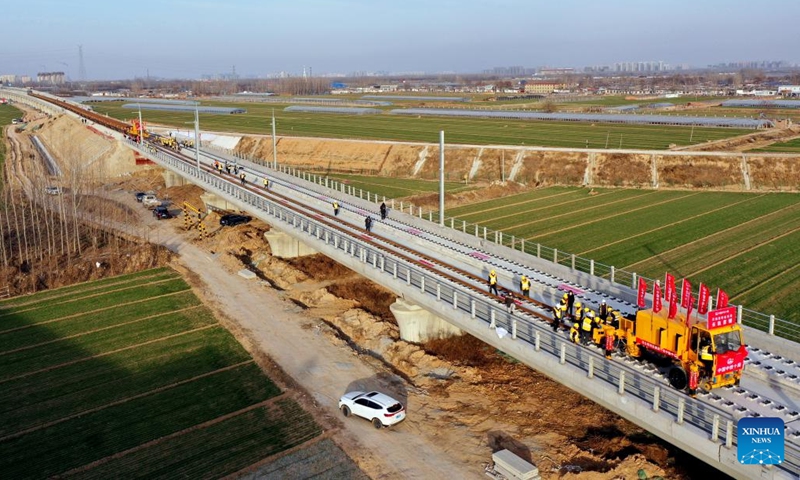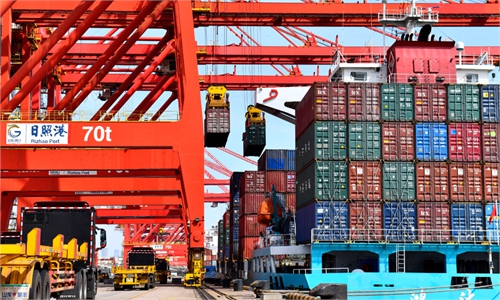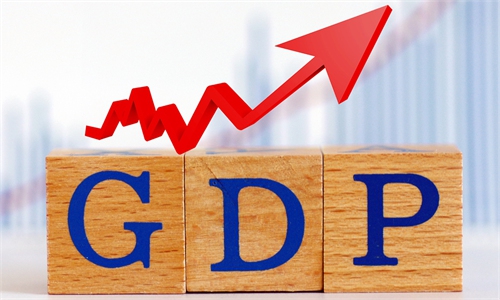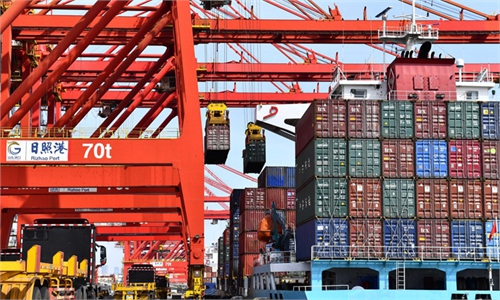Chinese provinces, cities roll up sleeves to pursue higher GDP growth rates this year
Companies feel 'supercharged' by grand construction plans, new opportunities

This aerial photo taken on Dec. 15, 2022 shows workers laying tracks at the construction site of the Jinan-Zhengzhou high-speed railway in Liaocheng City, east China's Shandong Province. The track-laying ceremony of the Shandong section of Jinan-Zhengzhou high-speed railway was held in Liaocheng City on Thursday.(Photo: Xinhua)
Localities across China pressed the start button of the Year of the Rabbit with economic meetings chaired by leading government officials, plans emphasizing new projects build-up and letters to foreign-invested companies promising further openness.
The central government has vowed to focus on achieving rapid economic recovery after optimizing pandemic response.
The meetings also mapped out specific measures aimed at accelerating domestic consumption recovery and stabilizing foreign trade and investment.
From South China's Guangdong Province to Northeast China's Jilin Province, local officials convened the meetings to emphasize the implementation of investment projects, the improvement of local business environment and efforts to court foreign investors on Saturday, the first working day after the week-long Spring Festival holidays.
Guangdong Province, an economic powerhouse with GDP growth of 1.9 percent in 2022, is eyeing growth at 5 percent for 2023. It started the first working day of the Chinese New Year with a meeting attended by more than 26,000 officials and company executives. The meeting was the largest in years, according to Xinhua News Agency.
At the meeting, it was announced that the 133rd Canton Fair, one of the most important trade fairs in China, would fully resume its on-site exhibitions on April 15.
Xie Huiyu, a representative of Switzerland-based Amcor, a consumer goods packaging company, attended the meeting in Guangzhou, provincial capital of Guangdong.
Xie said as a manager of a foreign-invested company, she felt the meeting was "grand and unusual" and felt "tremendously supercharged".
She noted that the meeting was briefed by the top brass in each of the departments related to economic development.
"Before attending, we actually received invitations from the provincial, city, county, district and township levels, a sign that Guangdong is all-in on economic development this year," Xie said. "There is a feeling that people here are counting on this year to make up for the losses in the last three years."
Her company has invested in and set up seven plants in several Guangdong cities, and Xie said her innate feeling after attending the meeting was that Guangdong was a faultless choice.
In Shanghai, China's financial and trade hub, the local party chief highlighted the importance of improving the business climate to stabilize expectations and boost confidence.
In East China's Zhejiang Province, a major center of manufacturing, top government officials vowed to innovate and improve the quality of the digital economy and accelerate the implementation of major projects.
In a bilingual letter to foreign-invested companies, Zhejiang's commerce department head Han Jie wrote that in 2023, the province will "attract global investment and cooperation with resolve, extraordinary measures and great efforts."
Cong Yi, dean of the School of Marxism at the Tianjin University of Finance and Economics, told the Global Times on Sunday that the localities' efforts are centered on injecting new vitality into the economy.
"The new year's economic plans will serve the goal of stabilizing expectations, while also taking into consideration of a looming global recession, and the decoupling by the US and its hardcore allies," Cong said.
China's restart of work following the Spring Festival holidays came as international institutions, investors and financial institutions were buoyed by the country's economic outlook, seeing the recovery gain traction.
According to the UN World Economic Situation and Prospects 2023 report released on January 25, global growth is projected to decelerate from an estimated 3.0 percent in 2022 to 1.9 percent in 2023.
Meanwhile, China's economic growth is forecast to accelerate to 4.8 percent this year, thanks to the government's adjustment of its COVID-19 policy and the easing of monetary and fiscal policies.
Many global institutions also noted that China's economic activity quickly gained pace, as the country saw a tourism boom during the week-long Spring Festival holidays.
Analysts at Japanese brokerage Nomura said that consumption of in-person services had recovered notably, as seen in the rebound of trips made and tourism earnings, according to Reuters.




